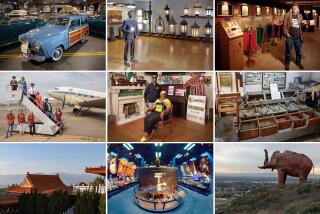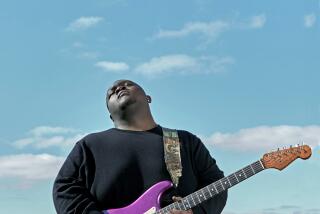B.B. King’s not ready to be a museum piece
B.B. King is full of it. Humility, that is.
Listen to what the blues master has to say about the $15-million museum bearing his name that’s slated to open Saturday in the small Mississippi Delta town where he sweated for a few cents a day picking cotton nearly eight decades ago.
“When you’re running track, they pass you -- I don’t know what you call it . . . -- the baton. I just picked up the baton and kept running with it. But guys like Robert Johnson, Jimmy Rogers, Memphis Slim, Roosevelt Sykes, and I could name you many, many more -- they are the ones that were the base,” King said last week during a stop in L.A. “They could have picked any one of them to name the museum after.”
Not likely. Especially not in Indianola, Miss., where perhaps more than anywhere else, the man born Riley B. King in 1925 will forever reign as the King of the Blues.
So, it’s the B.B. King Museum and Delta Interpretive Center that he’ll christen this week, an opening timed, not coincidentally, near its namesake’s 83rd birthday on Sept. 16.
“I think I may have planted the seed,” he said, seated comfortably in a throne-like chair, dressed meticulously, as he typically is on stage, in a dark suit, neatly pressed shirt and tie and what look like size 13 spit-polished black loafers. Gold-framed glasses glint in the light next to his ever-whitening short, curly hair.
“I don’t live in my home state now, but I bought some land down there and I was going to build me a house on it,” he said softly. “After my demise I wanted this to be open as a museum . . . But they said, ‘Why wait till you die? We do it now, you could see it!’ I like that idea.”
The facility’s been built with a combination of private and public funds, including some sizable corporate donations. Officials in Mississippi hope it will be a boost for tourism to the western part of the state, where Indianola sits between Jackson and Memphis, along the celebrated Highway 61. The 18,000-square-foot museum is built around an old cotton gin mill, one, in fact, where King worked as a boy.
He’s donated much of his own collection of memorabilia from his long career -- “much more than I wanted to,” he said with an easy laugh. That includes the guitar he calls “Lucille’s sister,” a sibling to the celebrated black Gibson he still plays on stage 100 to 125 nights a year.
“Like a fool I let ‘em come to my house and I said, ‘Anything you want, you get it.’ And they took damn near everything except the house -- and me,” he said, still chuckling. “But I’m glad to do it, because I love to share everything I’ve had, trying to learn to play blues and trying to do what I’ve done.”
To King, however, it’s less about seeing his own life institutionalized than keeping the blues flame alive for new generations of musicians and fans, “to let people know about the origins of this music.”
“There’s a plantation that’s been there since slavery, called the Dockery Plantation, and it’s said all of us blues singers were born within 100 miles of it,” King said. “For all this information to be out, publicly known, I think will be good not only for Mississippi, but for the world that likes blues music.”
The Delta Interpretive Center component aims to become a comprehensive and authoritative resource dedicated to this indigenous American art form.
“When they start talking about the educational side of it, I happen to believe that education is going to be the answer to our problems,” King said. “I didn’t get much of an education -- I only went through the 10th grade. And I’m for everybody going as far as a possible. I’m a diabetic, and I believe that some of these young people today will be the answer to diabetes.”
By the same token, he wants others to get their time with the baton he picked up so many years back.
“Now that I’m part of the over-the-hill gang, I don’t think so much about myself,” he said, “but what about these young guys? Keb’ Mo’, Jonny Lang, Kenny Wayne Shepherd, Robert Cray, what about them? . . . I’m hoping people will go to this museum and see where this is important to a lot of people.”
The idea of celebrating the roots of the music to which he’s dedicated his life extends -- by coincidence, he insists -- to his new album, “One Kind Favor,” produced by T-Bone Burnett, fresh off his acclaimed roots project uniting Robert Plant and Alison Krauss, “Raising Sand.”
Where King’s albums in recent years often have been populated with famous guests, he essentially solos it this time out, paying tribute to the blues artists and songs he remembered from his youth. They run from blues giants Robert Johnson and Blind Lemon Jefferson to more obscure artists such as Lee Vida Walker and John Willie “Shifty” Henry.
Burnett wanted to capture the flavor of King’s recordings from his heyday in the ‘50s, and he teamed King up with a combo consisting of Dr. John at the piano, bassist Nathan East and drummer Jim Keltner. The result is a taut musical exchange with plenty of spontaneity and a deep, gritty sound, the sonic equivalent of an aromatic pot full of dirty rice.
“He liked the sounds of those records I made in the ‘50s, and so do I,” King said. “I hear a lot of people saying now, ‘Those things you used to do, they’re something else.’ But they didn’t like ‘em when I was doing ‘em! That has me bothered a bit. . . . But that’s the way it was. However it may have been or it may be today, I’m so pleased that I’m still living and able to hear the people say, ‘That was good. We liked it.’ ”
--
More to Read
The biggest entertainment stories
Get our big stories about Hollywood, film, television, music, arts, culture and more right in your inbox as soon as they publish.
You may occasionally receive promotional content from the Los Angeles Times.










